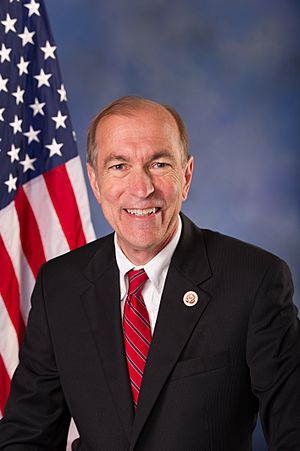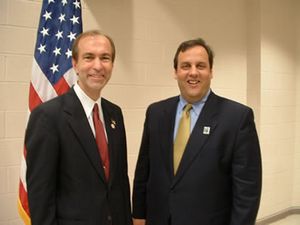Scott Garrett facts for kids
Quick facts for kids
Scott Garrett
|
|
|---|---|
 |
|
| Member of the U.S. House of Representatives from New Jersey's 5th district |
|
| In office January 3, 2003 – January 3, 2017 |
|
| Preceded by | Marge Roukema |
| Succeeded by | Josh Gottheimer |
| Member of the New Jersey General Assembly from the 24th district |
|
| In office November 19, 1990 – January 3, 2003 |
|
| Preceded by | Robert E. Littell |
| Succeeded by | Alison Littell McHose |
| Personal details | |
| Born |
Ernest Scott Garrett
July 9, 1959 Englewood, New Jersey, U.S. |
| Political party | Republican |
| Spouse | Mary Ellen Garrett |
| Children | 2 |
| Residences | Wantage, New Jersey, U.S. |
| Education | Montclair State University (BA) Rutgers University, Camden (JD) |
Ernest Scott Garrett (born July 9, 1959) is an American politician. He was a U.S. Representative for New Jersey's 5th district from 2003 to 2017. He is a member of the Republican Party. Before joining Congress, he served in the New Jersey General Assembly from 1990 to 2003.
Garrett also led a special committee in the House of Representatives that focused on financial markets. In 2016, he lost his re-election campaign to Democrat Josh Gottheimer. He was the only sitting Congressman in New Jersey to lose that year. In 2017, President Donald Trump nominated Garrett to lead the Export–Import Bank of the United States. However, the Senate Banking Committee did not approve his nomination.
Contents
Early Life and Education
Scott Garrett was born in Englewood, New Jersey, on July 9, 1959. He spent most of his life in northern New Jersey. He went to Montclair State College, where he earned a degree in political science in 1981. Later, he studied law at Rutgers School of Law–Camden, getting his law degree in 1984.
Starting His Political Career
Garrett began his political career in the New Jersey General Assembly. He was first elected in 1991 and served until 2003. During this time, he represented the 24th legislative district. This district included all of Sussex County and parts of Morris and Hunterdon counties.
Serving in the U.S. House of Representatives

Scott Garrett served in the United States House of Representatives for 14 years. He represented New Jersey's 5th congressional district.
How He Was Elected
In 2002, Scott Garrett ran for the U.S. House of Representatives. The previous representative, Marge Roukema, retired. Garrett won a tough primary election against several other candidates. He then won the general election with 60% of the votes.
He was re-elected several times, winning in 2004, 2006, 2008, 2010, 2012, and 2014. After the 2010 census, the boundaries of his district changed slightly. The new district included more areas that tended to vote for Democrats.
The 2016 Election
In 2016, Garrett ran for re-election. He faced Josh Gottheimer, a Democrat. During the campaign, it was reported that Garrett had made comments about not supporting gay candidates. This became a big issue in the election. Many groups, including some businesses that used to support Garrett, reduced their donations to his campaign.
On November 8, 2016, Josh Gottheimer won the election. Garrett lost by about 14,900 votes. He won in three of the four counties in his district, but he couldn't make up for the large number of votes he lost in Bergen County.
His Work in Congress
While in Congress, Garrett was part of several important committees. He served on the Budget Committee and the Financial Services Committee. He was also the chairman of the Subcommittee on Capital Markets and Government-Sponsored Enterprises.
Garrett was known for his very conservative voting record. He was considered one of the most conservative members of Congress from New Jersey. He also helped start the House Constitution Caucus and was a founding member of the Freedom Caucus.
Key Legislation
In 2013, Garrett introduced a bill called the Budget and Accounting Transparency Act of 2014 (H.R. 1872; 113th Congress). This bill aimed to change how certain government programs, like Fannie Mae and Freddie Mac, were counted in the federal budget. The goal was to make the budget more accurate.
Views on Important Issues
- Foreign Policy: In 2007, Garrett supported a bill that would allow Taiwan to become a member of the United Nations.
- Economic Policy: He supported a law against unlawful internet gambling. He also voted to allow oil and gas drilling off the coast of New Jersey. He voted against making "price gouging" by oil companies a crime.
- Education: As a state legislator, Garrett suggested that public schools should teach about intelligent design alongside evolution. He also tried to remove funding for educational programs for native Alaskans and Hawaiians.
- LGBT Rights: After same-sex marriage became legal in the U.S. in 2015, Garrett supported a bill that would allow businesses to refuse service for same-sex weddings based on religious beliefs. He also stated his opposition to funding campaigns for candidates who support same-sex marriage.
- Voting Rights: In 2006, Garrett was the only New Jersey congressman to vote against renewing the Voting Rights Act. He was against requirements to print ballots in languages other than English.
Export-Import Bank Nomination
In April 2017, President Donald Trump announced he would nominate Scott Garrett to lead the Export–Import Bank of the United States. This bank helps U.S. companies sell their goods and services to other countries. This nomination was surprising because Garrett had been a strong critic of the bank while in Congress. He believed the bank should not exist.
Many business groups and some senators opposed his nomination. They worried that Garrett, as a critic of the bank, would not be able to lead it effectively. In December 2017, the Senate Banking Committee voted against advancing his nomination. This meant he would not become the bank's chairman.
Personal Life
Scott Garrett is married to Mary Ellen Garrett. They have two adult daughters. They chose to homeschool their daughters because there was no high school in their area that offered a Christian education.
Images for kids
 | Roy Wilkins |
 | John Lewis |
 | Linda Carol Brown |


